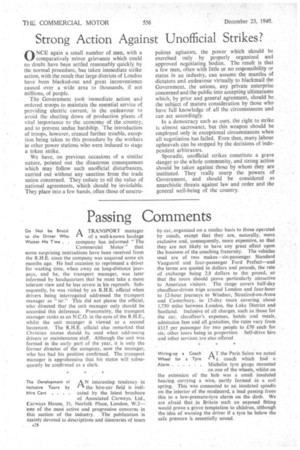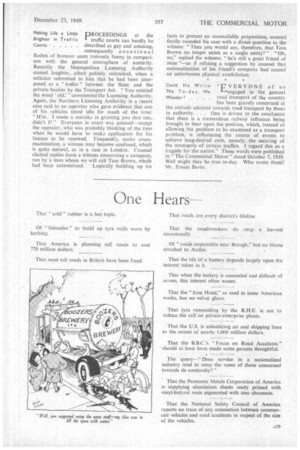Passing Comments
Page 30

Page 31

If you've noticed an error in this article please click here to report it so we can fix it.
Do Not be Brutal A TRANSPORT manager to the Driver Who of a well-known haulage Wastes His T'me . . company has informed "The Commercial Motor" that some surprising instructions have been received from the R.H.E. since the company was acquired some six months ago. He had occasion to reprimand a driver for wasting time, when away on long-distance journeys, and he, the transport manager, was later informed by headquarters that he must take a more tolerant view and be less severe in his reproofs. Subsequently, he was visited by an R.H.E. official when drivers being interrogated addressed the transport manager as "sir." This did not please the official, who directed that the unit manager only should be accorded this deference. Presumably, the transport manager ranks as an N.C.O. in the eyes of the R.H.E., whilst the unit manager is viewed as a second lieutenant. The R.H.E. official also remarked that Christian names should be used when addressing drivers or maintenance staff. Although the unit was formed in the early part of the year, it is only the former director of the company, now the manager, who has had his position confirmed. The transport manager is apprehensive that his status will subsequently be confirmed as a clerk.
The Development of A N interesting tendency in Inclusive Tours by rm. the hire-car field is indi
Hire Cars . . . . cated by the latest brochure
of Associated Carways, Ltd., Carways House, 31, Norfolk Place, London, W.2— one of the most active and progressive concerns in this section of the industry. The publication is mainly devoted to descriptions and itineraries of tours
A28 by car, organized on a similar basis to those operated by coach, except that they are, naturally, more exclusive and, consequently, more expensive, so that they are not likely to have any great effect upon the business of the coaching fraternity. The vehicles used are of two makes—six-passenger Standard Vanguard and four-passenger Ford Prefect—and the terms are quoted in dollars and pounds, the rate of exchange being 2.8 dollars to the pound, so that the tours should prove particularly attractive to American visitors. The range covers half-day chauffeur-driven trips around London and four-hour to 12-hour journeys to Windsor, Stratford-on-Avon and Canterbury, to 15-day tours covering about 1,750 miles between London, the Lake District and Scotland. Inclusive of all charges, such as those for the car, chauffeur's expenses, hotels and meals, admission fees and all gratuities, the rates vary from £115 per passenger for two people to E70 each for six; other tours being in proportion Self-drive hire and other services are also offered
Wiring-up a Coach A T the Paris Salon we noted Wheel for a Tyre r-1 a coach which had a Alarm Michelin tyre gauge mounted
on one of the wheels, whilst on the extension of the hub was a small insulated bearing carrying a wire, partly formed as a coil spring. This was connected to an insulated spindle on the interior of the mudguard, a lead passing from this to a low-pressure-tyre alarm on the dash. We are afraid that in Britain such an exposed fitting would prove a grave temptation to children, although the idea of warning the driver if a tyre be below the safe pressure is essentially sound.
Making Life a Little pIROCEEDINGS at the
Brighter in Traffic I traffic courts can hardly be Courts described as gay and amusing,
consequently occasional. flashes of humour seem riotously funny in comparison with the general atmosphere of austerity. Recently the Metropolitan Licensing Authority caused laughter, albeit politely restrained, when a solicitor submitted to him that he had been interposed as a " buffer " between the State and the private haulier by the Transport Act. "You omitted the word old,' "commented the Licensing Authority. Again, the Northern Licensing Authority in a recent case said to an operator who gave evidence that one of his vehicles stood idle for much of the time:
" T made a mistake in granting you that one, didn't I?" Everyone in court was amused—except the operator, who was probably thinking of the time when he would have to make application for his licence to be renewed. Frequently, under crossexamination, a witness may become confused, which is quite natural, as in a case in London. Counsel elicited replies from a witness concerning a company, run by a man whom we will call Torn Brown, which had been nationalized. Logically building up his facts to present an unassailable proposition, counsel finally rounded his case with a direct question to the witness: "Then you would say, therefore, that Tom Brown no longer exists as a single entity?" "Oh. no," replied the witness; "he's still a great friend of mine "—as if refuting a suggestion by counsel that nationalization of his friend's company had caused an unfortunate physical annihilation: * . *
Could He Write "EVERYONE of us This To 'We i'engaged in the general Wonder ? . road transport of the country has been gravely concerned at the attitude adopted towards road transport by those in authority. . . . One is driven to the conclusion that there is a tremendous railway influence being brought to bear upon the position, which, instead of allowing the problem to be examined as a transport problem, is influencing the course of events to achieve long-desired ends, namely, the securing of the monopoly of certain traffics. I regard this as a tragedy for the nation." These words were published in"The Commercial Motor" dated October 7, 1939. Well might they be true to-day. Who wrote them? Mr. Ernest Bevin.




















































































